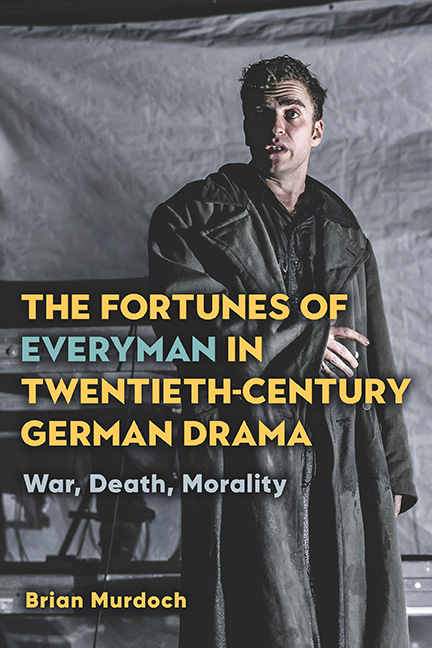Book contents
- Frontmatter
- Dedication
- Contents
- Preface
- Introduction
- Chapter One Everyman and Jedermann
- Chapter Two Hinkemann: Ernst Toller and the Effects of the First World War
- Chapter Three Beckmann: Wolfgang Borchert, the Medieval Medium, and the Modern Message
- Chapter Four Biedermann: Max Frisch and a Morality Play without a Moral
- Conclusion
- Bibliography
- Index
- Frontmatter
- Dedication
- Contents
- Preface
- Introduction
- Chapter One Everyman and Jedermann
- Chapter Two Hinkemann: Ernst Toller and the Effects of the First World War
- Chapter Three Beckmann: Wolfgang Borchert, the Medieval Medium, and the Modern Message
- Chapter Four Biedermann: Max Frisch and a Morality Play without a Moral
- Conclusion
- Bibliography
- Index
Summary
The focus here has been on three twentieth-centuryGerman plays, all with links to, and capable ofcomparison with the late medieval morality play ofEveryman and itsmodern German adaptation by Hofmannsthal. Theclearest link is in the name of the centralcharacter in each case and the use of descriptivenames for some of the other characters. LikeEveryman, the central characters in the three playsdevelop in, or at least move through a series ofstages, albeit not the same as those passed throughby Everyman, nor indeed even in the same direction.Borchert and Frisch have characters speak to theaudience directly, another link with Everyman, where the audienceis also addressed directly at the end, even if notby one of the principal characters. As well asechoing aspects of the morality play—God and Deathactually appear in Borchert's drama, forexample—features of expressionism, notably of theStationendrama, arepresent, even if in deliberately distorted form, inall three plays, not just in Toller’s. The plays byToller and by Borchert use the simple and directlinguistic style associated with the expressionistmovement. Furthermore, the spirit of classicaltragedy is present in all of these modern works aswell, most overtly in Frisch's play. The play byFrisch, while influenced by and indeed more directlyreferencing Everymanthan the others, is nevertheless more complex in itsrelationship to the tradition. The term “parody,”which is sometimes applied both to the relationshipbetween Frisch's play and Everyman/Jedermann, and indeed also toits borrowing of the idea of a chorus from classicaltragedy, is not necessarily always apposite. Wherein Everyman and in theplays by Toller and Borchert the central figureprogresses at least towards knowledge, in Frisch'splay the central figure possesses from the start theknowledge he requires, but never uses it. In thisrespect it is more of a counter-Everyman than the other two plays.
The three modern plays each reflect and can at onelevel be interpreted in the context of a specifichistorical situation: respectively, the First WorldWar, the Second World War, and, although lessdirectly, and, unlike the others, not concernedspecifically with Germany, the Cold War and thepossibility of a Third World War.
- Type
- Chapter
- Information
- The Fortunes of Everyman in Twentieth-Century German DramaWar, Death, Morality, pp. 139 - 164Publisher: Boydell & BrewerPrint publication year: 2022



